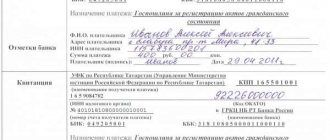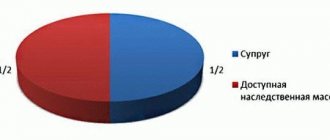Expenses at a notary's office
The legal successor pays for the services provided by the notary office. There is no single tariff established. Each individual region has its own prices.
Thus, in the capital region for the current year the following price list is in effect:
- technical and advisory services for drafting the text of an application for acceptance of the inheritance from the successor - 800 rubles;
- if it is necessary to record a statement of consent to inheritance after the death of a spouse, the cost of legal advice and drafting the text of the document increases to 900 rubles;
- registration of an heir's certificate for the common property of the spouses in a situation with a real estate object will amount to 3 thousand rubles. and higher, and for other objects (for example, a car) - from 1 thousand.
Registration of the certificate will cost applicants the following amounts:
- 100 rub. for drawing up a document to receive the balance of pension savings.
- 1 thousand for a financial deposit kept in the bank.
- 5 thousand for one immovable property (dacha, apartment).
- 3 thousand for paperwork for all other property objects (car, antiques).
If the deceased individual did not leave a last expression of will, then inheritance occurs according to law. Then, when visiting the office, applicants undertake to provide a document proving the presence of family ties with the deceased testator. In some circumstances, the amount of state duty is determined by the order of inheritance under the law.
How much does it cost to inherit?
The amount of the state duty is calculated based on the specific price of a private house, communal room or other housing, which was established by a professional appraiser.
After the death of his mother, G.S. Ivanov inherited a two-room apartment. On the recommendation of a notary, Ivanov G.S. turned to an independent professional appraiser.
As a result, the inherited apartment was valued at 2,270,000 rubles. (market price). Then, the heir contacted the local BTI. There the apartment was valued at 820,000 rubles.
Ivanov came to his notary with 2 certificates about the appraisal of the apartment (from the appraiser and from the BTI). In the first situation, the heir was asked to pay a fee equal to 6810 rubles. = 0.3% * 2,270,000 rubles, and in the second - 2,460 rubles. = 0.3% * 820,000 rub. As a result, Ivanov chose the second, most profitable option.
When officially accepting a specific property as an inheritance, you need to know how the state duty is calculated in this situation. Below are two examples.
Read also: Universal succession
Initial conditions: according to the will, the heir was left a one-room apartment and a dacha. The cadastral value of the first property is 1,000,000 rubles, and the second - 500,000 rubles.
According to the will, the husband left his own apartment and dacha to his wife, who was with him until his death. In this situation, the following fee is paid for inheriting a dacha - 1,500 rubles. = 0.3% * 500,000 rub.
When re-registering legal rights to inherited real estate, the widow must go to Rosreestr and pay the following state fees to the budget: 2,000 rubles. - for a one-room apartment and 350 rubles. - to a dacha with an allotment. Total, in this situation, the heiress will pay 3,850 rubles for registration of specific inherited property. = 1,500 rub. + 2000 rub. + 350 rub.
The deceased testator-grandfather bequeathed his apartment and dacha to his granddaughter, who lives in another city. In this situation, for the re-registration of property, the heiress must pay the following amount of state duty = 9,000 rubles. (to a notary) + 2,000 rub. + 350 rub. (to Rosreestr) = 11,350 rub.
When accepting a certain inheritance, heirs with 1 or 2 disability groups pay 50% of the specific tariff for notary services. This benefit is provided to all similar categories of citizen applicants, regardless of the following parameters:
- degree of relationship;
- established share in the inheritance;
- line of official inheritance.
The death of a relative is a tragic event.
Along with a bereavement, the relatives of the deceased also have to carry out a mandatory legal procedure - accepting an inheritance if the deceased left one.
First you need to enter into an inheritance, which is accompanied by certain financial expenses. Therefore, the cost of registering an inheritance with a notary after death should be found out before registration.
After the death of a relative, in order to receive his inherited property, the heirs must visit a notary office to accept the inheritance. According to Art. 1153 of the Civil Code of the Russian Federation, this is done by sending an application for acceptance of the inheritance or issuing a certificate of right to it.
One of the application options must be submitted to the notary at the place of opening of the inheritance, who, according to Art. 1115 of the Civil Code is the last place of residence of the deceased or the location of his property.
The applicant chooses the method of submission independently: in person, by post or through an authorized representative.
Six months after the death of a citizen, the notary is obliged to issue a certificate of the right to inheritance to all called successors.
It can be issued to each heir separately, for each type of property, or for all heirs together.
At this stage, a notary fee is charged for entering into an inheritance. This, however, is not the only payment that a notary may require.
According to Art. 22 Fundamentals of legislation on notaries, all notarial actions are subject to payment in accordance with the requirements of the legislation on taxes and fees, state fees or notarial tariffs.
However, the state fee for registering an inheritance with a notary is far from the only payment. Not only that, such a fee can consist of several amounts depending on the actions performed by the notary. The cost of legal and technical services should also be added to it. The right to pay them is guaranteed to the notary by Art. 23 Fundamentals of legislation on notaries.
Unlike state fees and notary fees, the cost of these services is not regulated by law, and therefore is set by the notary at his own discretion.
Such services may include legal advice, drafting and production of documents, mediation in obtaining the necessary certificates, and the like.
How the state duty is calculated directly depends on the type of payment, the notarial acts for which the fee is paid, in some cases - on the value of the property, as well as the formula used.
For example, the amount of state duty on the inheritance of close relatives in 2021 will be less than the duty on the inheritance of unrelated persons. Different formulas are used when calculating, so it is advisable to consider each payment separately.
Amount of state duty
Often the amount of the duty is calculated as a percentage of the amount of the inherited object. Payments to the state budget are collected for the performance of legal actions by employees, officials, notaries, and judges.
You will have to pay a contribution to the state treasury for the following actions:
- for issuing a certificate of preference for property inherited from a deceased owner;
- safety of property (provided by an employee of the notary office);
- re-registration of ownership of an inherited object.
Close relatives - parents, spouse, children, as well as second-order heirs - full brothers and sisters have the right to receive a certificate of successor upon payment of 0.3% of the total value of the inheritance. However, the total payment volume should not exceed 100 thousand.
ATTENTION !!! Successors of subsequent stages undertake to pay 0.6% of the cost of the acquired property, but not more than 1 million rubles.
Taking measures to preserve the transferred property will cost 600 rubles. An office employee takes an inventory of the property and transfers it to one of the relatives of the deceased for safekeeping.
If the recipient of the inheritance is a citizen, then the transfer of property preferences, registered in Rosreestr, will amount to 2 thousand. When the prerogatives are transferred to a legal entity, the latter will receive a bill of 22 thousand for payment.
Registration of the prerogative of ownership of a dacha plot with buildings will cost 350 rubles.
Procedure for payment and amount of state duty on inheritance in Russia for 2021
As we have already indicated, an application to a notary’s office to receive an inheritance can be sent in different ways, at the choice of the applicant. However, if the application is sent to a notary by mail or transmitted through a third party, in accordance with Part 1 of Art. 1153 of the Civil Code, the signature on it is subject to mandatory certification of its authenticity.
For such notarial actions, the notary also collects from the applicant a state fee, the amount of which is determined by paragraphs. 21 clause 1 art. 333.24 Tax Code and amount to 100 rubles.
In order to preserve inherited property, as well as protect the rights of successors, legatees and other interested parties, sometimes a notary takes a number of measures to protect and manage the inheritance.
He does this at the request of successors, executors of wills, guardianship authorities, local government bodies and other persons interested in preserving the property of the testator.
These measures include:
- inventory and assessment of property;
- placing funds on your own deposit;
- informing law enforcement officers about the presence of weapons in the estate;
- concluding a trust agreement, and so on.
When a notary performs such actions, he also has the right to collect a state fee, which, according to paragraphs. 23 clause 1 art. 333.24 Tax Code, is 600 rubles.
In addition, if security measures concern the placement of funds or securities of the testator on the notary’s own deposit, in accordance with clause 8 of Art. 22.1 Fundamentals of legislation on notaries, for this a state fee is charged in the amount of 0.5% of the cost, but not less than 1 thousand rubles.
If the specified notarial actions are performed by an official outside the office, the cost of the fee, according to Art. 333.25 NK, increases by 50%.
If there are several heirs, each of them pays the specified fee independently.
There is no inheritance tax. However, there is a special case: when you still need to pay. If monetary rewards are transferred as an inheritance to the heirs of the authors:
- works of science;
- literature;
- art;
- discoveries;
- inventions;
- industrial designs.
This tax is 13% of the amount received.
You will also have to pay personal income tax in the amount of 13% to those who sell inherited property within a three-year period after the death of the testator (the starting date is the day of the death of the testator, and not the day of acceptance of the property). There is no contradiction to the law in this, since the tax is paid not for accepting an inheritance, but for receiving income from the sale of an inheritance.
At the choice of the heir, any of the following types of property value can be taken to calculate the amount of state duty:
- market;
- cadastral;
- inventory
They are not equal to each other, which means that the amount of duty that will have to be paid for entering into an inheritance depends on their choice.
For the most part, this choice of values applies to real estate. For other property, only market value can be used, for example, for cars.
To better understand this issue, we suggest that you familiarize yourself with the table.
| Confirmation document | |||
| Market | The tallest | An independent appraiser conducts an examination | Documentary conclusion |
| Cadastral | Usually below market value, but above inventory value | In Rosreestr | Certificate or cadastral passport |
| Inventory | Lowest | In BTI | Reference |
It is most profitable to use the inventory value, however, since 2013, the legislation has been changed and the cadastral value should be used to calculate taxes. This was due to the fact that the cadastral price is as close as possible to the market price, and the inventory price is 10 times less than the latter. In this regard, significant amounts are “underreceived” from the budget.
However, the Tax Code does not prohibit the use of inventory value. That’s why notaries continue to accept certificates from the BTI and calculate the notary fee from it. But there is already a practice that if the inheritance is opened after 01/01/2013, then the inventory value is not subject to application. It is required to establish the market value (if there is no cadastral value). The Ministry of Finance also wrote about this, letter dated April 4, 2021 N 03-05-06-03/19714.
However, this prohibition is not established by law. Only by 2020 is it planned to completely abandon such an assessment indicator, so this practice will soon end.
Example No. 1 . Sokolov G.S. how the heir of the first stage inherited an apartment, and he wants to receive the corresponding certificate. Upon arriving at the notary, he learned that it was necessary to have it assessed by independent appraisers, having in addition received from the “compassionate” notary a business card with the telephone numbers of a company providing such services. Without delving into the subtleties, Sokolov G.S. It was to them that I turned. As a result, he received a conclusion on the market value of the apartment, which was estimated at 2 million 270 thousand rubles. Already on the way to the notary's office, he met his lawyer friend, who said that the market value is the most unfavorable for calculating the state duty, and it is better, if possible, to take a certificate from the BTI indicating the inventory value. Both the notary and the appraiser did nothing illegal: the first received the largest amount of state duty, and the latter received “live” profit in the form of the notary’s clients. We managed to get a certificate and according to it the cost of the apartment was 820 thousand rubles. Sokolov came to the notary with two documents and, calculating that in the first case he would have to pay 0.3% x 2,270,000 rubles = 6,810 rubles, and in the second - 0.3% x 820,000 rubles = 2,460 rubles, of course he chose the inventory cost to determine the amount of duty.
The notary has no right to “hint”, give recommendations or openly force you to choose one or another type of value. His choice is the exclusive right of the heir.
If a notary has several types of values for the same object, then the lowest of the values is used to determine the amount of the state duty.
The fee for entering into an inheritance under a will is the same as for heirs by law. The mode of inheritance does not affect its size. Only family ties and the estimated value of the property play a role.
By the way, it also does not play any role in determining the size of what property you inherit. Apartments, cars, land plots, and securities are subject to a duty of 0.3% or 0.6% (depending on the relationship) of their assessed value.
Current benefits
Collection of funds in favor of the state does not occur when inheriting the following property objects:
- Shared home with the deceased (with proof of common residence in the last years of the deceased’s life).
- Rewards for authorship, pension payments, deposits in a financial institution.
- Insurance finance.
- Property of people who died while performing their civic duty.
- The property acquired during life is watered down by repressed individuals in the past.
According to the fixed rule in Article 407 of the Tax Code of the Russian Federation, the following are exempt from paying state duty:
- minor recipients of inheritance during the period of opening the case;
- successors suffering from severe mental illness;
- WWII participants;
- awarded the title of Hero of the Soviet Union or the Russian Federation;
- disabled individuals of groups 1 and 2;
- disabled since childhood.
The key basis for exemption from payment is the provision of a title document proving membership in a preferential category of citizens. Such papers include a conclusion from a medical institution, extracts from the medical history, and a certificate of award.
Registering an inheritance with a notary after the death of a relative: the cost of basic expenses
The cost of registering an inheritance with a notary after the death of a relative consists of the following payments:
- Notarial services. He can charge money for opening and reading a will after the death of a relative, certifying documentation, providing services for the preservation of property and other operations;
- Property valuation. Its results are necessary to determine the exact value of the inheritance, calculate deductions to the state, and monetary compensation if one of the parties agrees to replace the share in the property with money. Only accredited companies can carry out assessments;
- State duty. Money is provided for receiving government services. The amount of the state duty is fixed in the Tax Code of the Russian Federation. Its size is reviewed annually;
- Taxes. Contributions to the budget amount to 13% of the tax base. However, the amount from the property remaining after the death of a relative is not always paid.
Features of determining the collection volume, calculation examples
For each individual case, a separate calculation of the fee payable to the state treasury is made.
The final payment amount is influenced by the following factors:
- Degree of relationship with the deceased. Thus, the mother of the deceased will pay a smaller amount than the niece (Pirogov left a testamentary disposition in which he recorded the division of property in equal proportions between his mother and niece. During his lifetime, he acquired a two-room apartment in the city center worth 4 million rubles. Accordingly, the parent will pay 0 .3% of the amount - 12 thousand, and the niece - 0.6% - 24 thousand).
- The cost of the purchased property. If you acquire an apartment worth 1 million or a house worth 3 million as a result of inheritance, the state duty in the first case will be less than in the second.
ATTENTION !!! Current tax laws do not differentiate between inheritance by law or by will. You will have to pay the fee in both cases.
The fee payable cannot be divided among successors. Moreover, each of the recipients of the property pays the established payment in full. Payment of the state duty is mandatory for all heirs, with the exception of individuals who have a preference for the benefit.
Who does not pay the state duty or has a benefit
The Tax Code of the Russian Federation (Article 333.38) provides benefits for certain categories of persons when registering an inheritance. The following citizens are not required to pay state duty:
- To the heirs who, at the time of the testator’s death, lived with him in the same territory (the apartment was owned by the deceased).
- Persons who became recipients of the property of relatives who died while performing public service.
- Recipients who are declared legally incompetent or who are minor heirs.
Disabled people of the first and second groups have the right to pay only half of the required amount upon entry.
The state duty for entering into an inheritance by will and by law is the same for both cases. Do you still have questions or have difficulties registering your rights to the property of a deceased relative? You can write to our lawyers about your situation and get free, competent advice from a specialist.
Taxes on the sale of inherited property
Often, successors try to sell property received by inheritance as quickly as possible. In this case, the individual will have to pay income tax on the income received. Its volume is 13% of the total amount of financial proceeds.
At the same time, according to Art. 220 of the Tax Code of the Russian Federation provides a property deduction - the taxable amount is reduced by 1 million. For example, Pugovkin sold an apartment inherited from a deceased aunt for 3 million rubles. After receiving the funds, he must pay personal income tax. A man will pay 13% based on 2 million (since he will take advantage of the preference for property deduction).
ATTENTION !!! However, heirs will not always have to pay income tax after the sale of the property. Clause 3 art. 217.1 of the tax legislation established a period of 3 years, after which successors are exempt from paying personal income tax when selling a land plot, house or apartment of the testator (having been the owner of the property for 3 years can actually avoid paying tax on the sale of a home).
If you want to sell the property before the deadline, you can take advantage of a deduction of 250 thousand rubles.
Inheritance tax
The duty on the inheritance of an apartment by law and by will is a mandatory payment that replaced the abolished entry tax, which existed before 2005.
Registration of acceptance of the testator's property ends with the issuance of an inheritance certificate. This document is the basis for further registration of ownership rights to the property due to the recipient of the deceased citizen. It is impossible to obtain this document without paying a fee.
Remember the deadlines: you need to contact a notary to enter into an inheritance within 6 months from the date of death of the testator.
other expenses
Additional expenses occur when disputes arise between heirs or when the established deadline for entering into an inheritance is missed. To restore the lost period of time, the applicant will have to initiate legal proceedings.
It is also possible to act as a plaintiff if there are disagreements with other successors (unfair distribution of property, recognition of one of the successors as unworthy, assessment of the will drawn up by the deceased as invalid). When going to court, you will need to pay a court fee. If the services of representatives are required, then they are also subject to payment.
Thus, the state duty when accepting an inheritance mass represents payment for legally significant actions of an authorized notary. The amount of state duty is individual, since it is determined by the estimated value of the inherited object and the degree of relationship with the deceased individual. A complete exemption from paying the duty is offered to heroes of the USSR, the Russian Federation, individuals under 18 years of age, and disabled legal successors. The availability of benefits is confirmed by documentary certificates from medical institutions and various certificates.
Who can register an inheritance with a notary on preferential terms?
The cost can be reduced if a person has the right to preferences. The list of persons who may not pay state duty is reflected in Articles 333.35 and 333.38 of the Tax Code of the Russian Federation. The list includes:
- Participants of the Second World War;
- Heroes of the USSR or the Russian Federation;
- Children of citizens who died in the line of duty;
- Incapacitated persons.
The list is not exhaustive. If you contact MIP for help, we will check whether you can count on preferential processing. Please note that in some situations the payment amount is reduced by only 50%.







